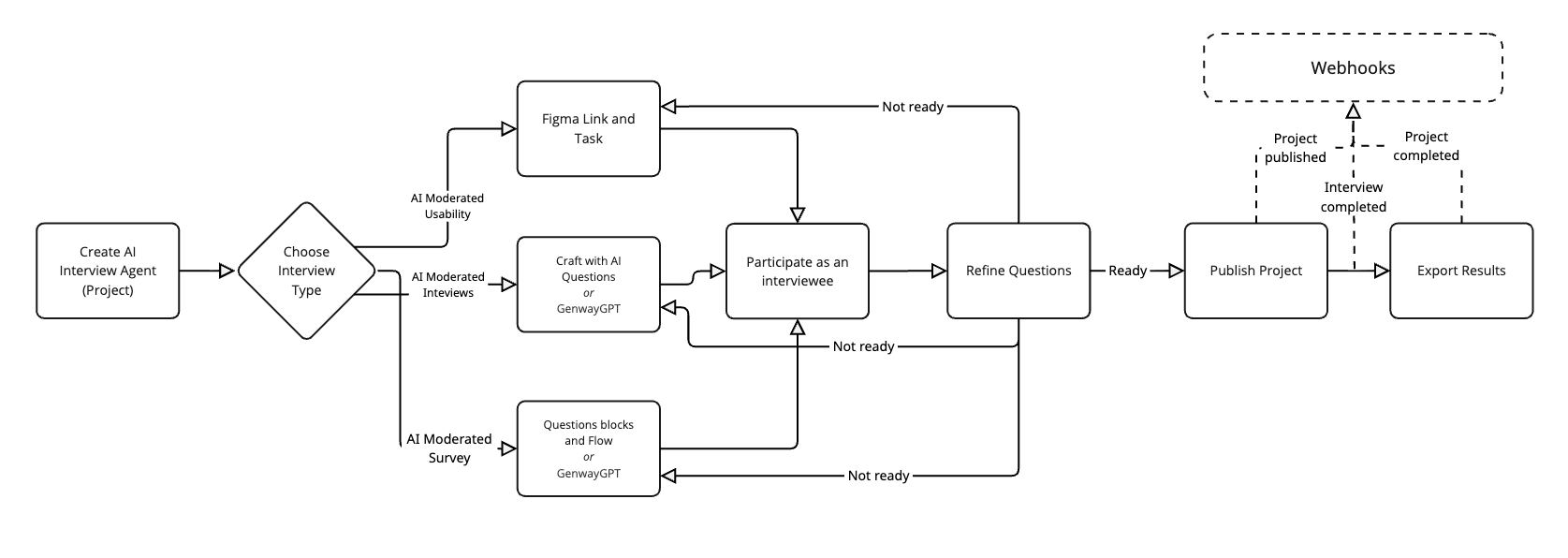Manage tenant creation and multi-tenancy setup.
- Getting Started with Multi-Tenancy
Genway Public API (1.0.0)
Genway's API enables you to programmatically manage various aspects of your projects, prototypes, and interviews using our AI interviewer.
- Projects - Create and manage Contextual Interviews or Prototype Testing projects.
- Interviews - Manage and export interview data, including transcripts, summaries, audio, and video.

Genway API uses dual-header authentication for all requests to ensure secure access and proper tenant isolation.
Required Headers:
X-Api-Key: YOUR_API_KEY
X-Tenant-Id: YOUR_TENANT_UUIDBoth headers are mandatory for every API call. Missing either header will result in authentication failure.
We strongly aim for backward compatibility for the documented endpoints. If backwards-incompatible changes are made, we will aim to release a new version.
- URLs’ entry point is
https://api.genway.ai/. - URLs are versioned
https://api.genway.ai/v1/{endpoint}, e.g.https://api.genway.ai/v1/projects.
The Genway API enforces per-IP rate limits to keep the platform responsive:
| Scope | Limit | Endpoints / Examples |
|---|---|---|
| Global throughput | Up to 50 requests per minute per IP | Applies to every endpoint, including Export interview video and Activate project. |
| Project creation | 10 requests per minute per IP | Create a new project (POST /projects). |
When a limit is exceeded the API responds with 429 Too Many Requests, includes a Retry-After header indicating when you can resume sending requests, and returns the rate-limit payload documented in the 429 response example for endpoints such as Create a new project.
You can subscribe to our status page.
If you require help you can contact our support team at support@genway.ai.
- Create a Tenant: Use the tenant creation endpoint to get your credentials
- Test the Platform: Use our standard onboarding to familiarize yourself with Genway's features
- Review API Documentation: Identify the endpoints needed for your integration
For enterprise and partnership setup and support, contact us at support@genway.ai.
Genway uses API keys with different scopes for different purposes:
Partnership API Keys
- Used exclusively for creating new tenants via the tenant creation endpoint
- Provided manually by the Genway team for partners and enterprises
Standard Tenant API Keys
- Used for all regular API operations (projects, interviews, webhooks, etc.)
- Generated automatically when a tenant is created
- Each tenant receives their own unique API key for data isolation
Partnership Key Requirement
- Tenant creation requires a special Partnership Key provided by the Genway team
- Contact support@genway.ai to obtain your partnership key
- This key is generated manually and is required for the tenant creation endpoint
Automated Tenant Creation
- Use the tenant creation endpoint to programmatically create new tenants
- Include the partnership API key in the
X-Api-Keyheader - Each tenant receives a unique
TENANT_IDand correspondingTENANT_API_KEY - Keys do not expire and are unique per tenant
- 1:1 Mapping: Each
TENANT_API_KEYis strictly matched to its correspondingTENANT_ID - Dual Header Verification: Both headers act as security layers for all operations
- Tenant Isolation: Prevents data leakage and misuse between different tenants
- Validation: Mismatched keys and tenant IDs will result in authentication failure
Webhooks
Webhooks deliver event data to your applications as it happens, offering an alternative to frequent data polling.
- The
secretcreated via the/webhooks/secretsendpoint is permanent and should be stored securely in your system. This secret will serve for the verifying section. - The
x-hook-secretis temporary and should be used only once during the confirmation process. - Until the webhook is confirmed, no events will be sent to the subscriber's endpoint.
Errors
The Genway API uses standard HTTP response codes to indicate the success or failure of the request. Codes follow this pattern:
- 2xx codes indicate success.
- 4xx codes indicate a request that failed given the information provided (e.g., a required parameter was omitted).
- 5xx codes indicate an error with Genway's platform.